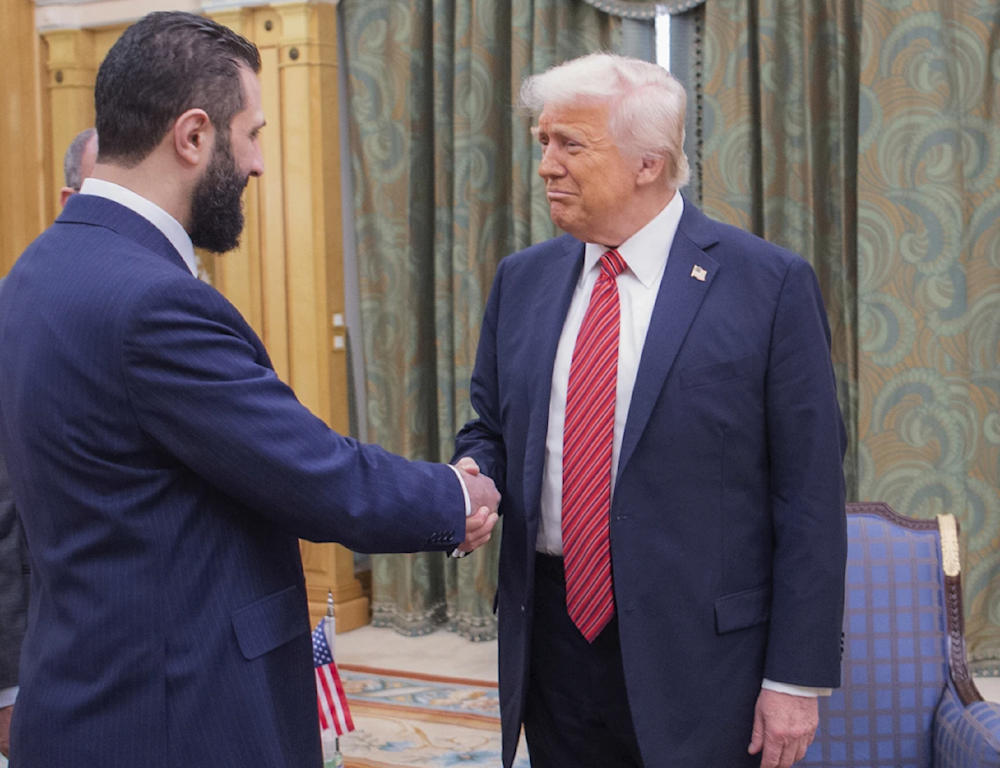Preliminary US-backed talks underway between 'Israel', Syria: Axios
Israeli officials say Netanyahu envisions a full "peace" treaty and diplomatic normalization.
-

US President Donald Trump shakes hands with Syria's interim President Ahmad al-Sharaa in Riyadh, Saudi Arabia, on May 14, 2025. (AP)
The Trump administration has begun early discussions with "Israel" and Syria about a potential security agreement, US and Israeli officials told Axios, marking the first steps toward reducing tensions between the longtime adversaries.
While formal normalization is not yet on the table, the talks aim to update border security arrangements and possibly pave the way for future diplomacy.
Following the fall of the Assad government last year, Donald Trump announced plans to ease sanctions on Syria to support its reconstruction and reintegration. According to Axios, while the US envisions a gradual approach, "Israel" is looking for firm commitments that talks will lead to full normalization.
Read more: Trump could bring Netanyahu, Syria’s al-Sharaa to normalization talks
Phased approach toward peace
In early June, Israeli occupation Prime Minister Benjamin Netanyahu expressed to President Trump’s Syria envoy, Tom Barrack, his interest in pursuing a US-brokered security agreement with Syria’s post-Assad government.
According to a senior Israeli official, Netanyahu envisions a phased approach, beginning with an updated version of the 1974 disengagement of forces agreement and eventually leading to a full peace treaty and diplomatic normalization.
After Ahmad al-Sharaa took power in December, "Israel" launched a series of airstrikes that decimated Syria’s remaining military assets, including its air force, navy, missile systems, and air defenses.
"Israel" also seized control of the buffer zone and advanced into Syrian territory, occupying key areas such as the Syrian side of Mount Hermon, a strategic high point.
Occupied territories critical bargaining chips in 'Israel's' hands
Israeli officials now see their hold on these territories as critical bargaining chips and have made clear that any withdrawal will depend on Syria agreeing to a comprehensive "peace deal" and full normalization of relations.
"Israel" is currently engaging with Syria through at least four separate channels: "National Security" Advisor Tzachi Hanegbi, Mossad Director David Barnea, Foreign Minister Gideon Saar for political and strategic dialogue, and the Israeli occupation forces, which handle daily military coordination.
Despite these ongoing lines of communication, Israeli officials are urging the US to take a more prominent mediating role, believing American involvement would encourage Syria’s new leadership to engage more seriously.
'Israel' wants US to be more assertive
US and Israeli officials confirmed that Trump’s Syria envoy, Tom Barrack, has maintained contact with Syrian counterparts since his visit to "Israel" in early June, aimed at exploring the launch of formal negotiations.
"We are having very soft preliminary discussions. Diplomatic breakthroughs are like unwrapping an onion — we are peeling," a senior US official told Axios, adding that President Trump and Secretary of State Marco Rubio are fully supportive and that coordination between the US and "Israel" is strong.
For now, the talks involve only mid-level officials and do not include Syrian President Ahmad al-Sharaa, nor are there plans yet for a leaders’ summit, according to a US official.
Two senior Israeli officials acknowledged that while a deal is within reach, progress will be gradual. "We hope to see the Trump administration pushing more assertively on this track," one official said.
Golan to remain under Israeli control
One of the key unresolved issues in any potential Israeli-Syrian "peace deal" is the status of the Syrian Golan Heights, a strategic plateau that "Israel" occupied during the 1967 war.
In past negotiations spanning three decades, the al-Assad regime consistently demanded full or near-full Israeli withdrawal from the Golan in exchange for "peace". During his first term, President Trump formally recognized Israeli sovereignty over the territory, a controversial move that the Biden administration chose not to reverse.
On Monday, Israeli Foreign Minister Gideon Sa'ar reaffirmed that while "Israel" is open to reaching an agreement with Syria, the Golan Heights will remain under Israeli control as part of any future deal.
Ron Dermer, a close advisor to Prime Minister Benjamin Netanyahu and "Israel’s" minister for strategic affairs, is in Washington this week for meetings with senior White House officials, where the potential Syria agreement is expected to be on the agenda.
Israeli officials say Netanyahu is also preparing for an upcoming visit to the White House, where Syria and broader regional developments will feature prominently in talks with President Trump.

 4 Min Read
4 Min Read









